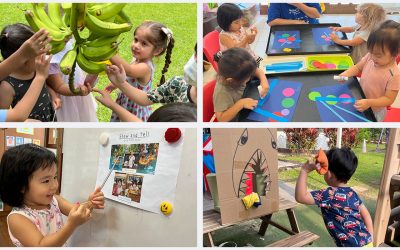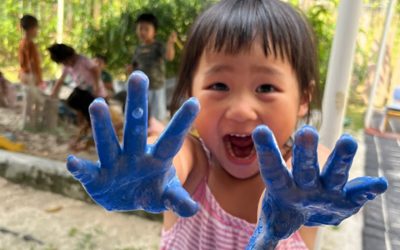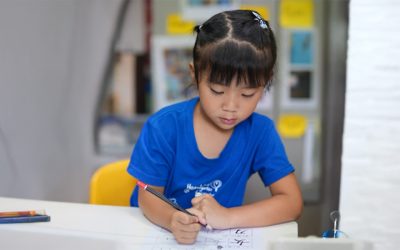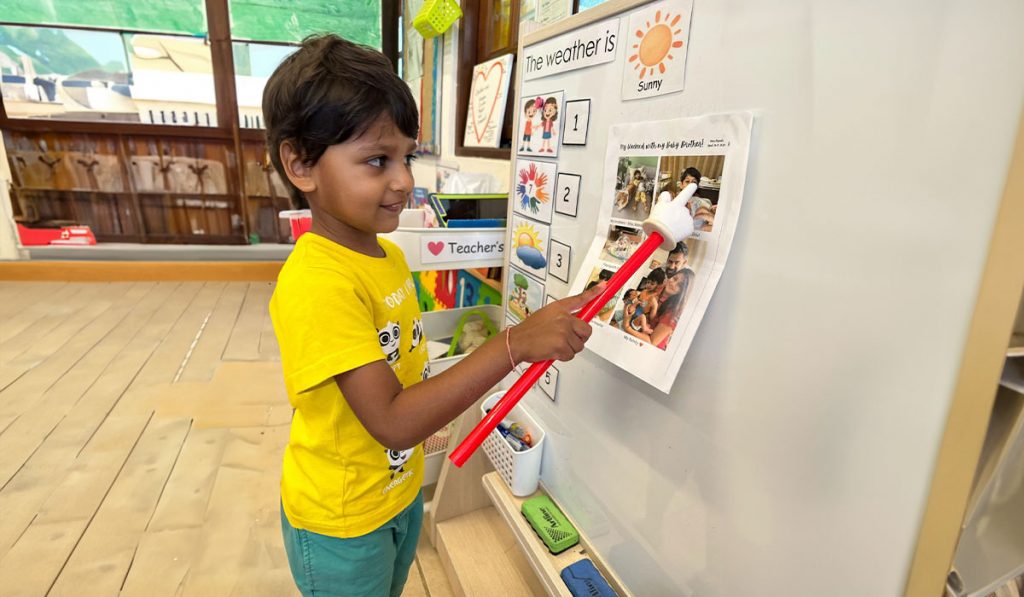
What makes a child thrive in their early years? Strong language and literacy skills are key to that success. But literacy isn’t just about learning to read—it’s about expressing ideas, understanding the world, and building connections with others.
Play-based literacy lays the foundation for these essential skills. By engaging in meaningful activities like storytelling, role-playing, and creative writing, children naturally develop their ability to listen, speak, read, and write.
Such a pedagogical approach not only makes learning fun–it ensures that children are able to meet important literacy standards. They include recognising sight words, forming basic sentences, and understanding vocabulary and comprehension.
In this article, we’ll explore how play-based literacy supports these developmental milestones and helps children meet literacy standards in an engaging, enjoyable way. You’ll also discover how Heartfield Kindergarten integrates these activities into its curriculum to create confident, curious learners ready for primary school and beyond.
Why is Language and Literacy Important for Young Children?
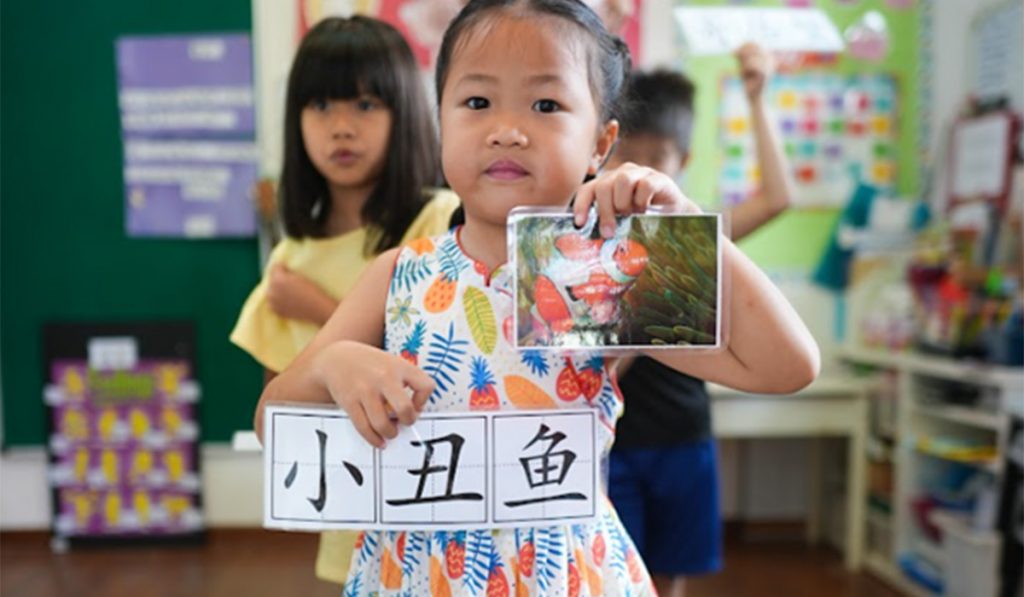
When we think about literacy, the first thing that often comes to our mind is reading—specifically the decoding skill. This is where our children learn to turn letters into words and words into sentences.
While this is a key part of literacy, it’s merely the tip of the iceberg.
Language and literacy encompass communication, creativity, relationships, and socialisation. It goes beyond phonics and decoding to include skills like speaking, listening, comprehension, critical thinking, and self-expression. Such abilities are essential for a child’s overall development.
Let us look at some of the benefits of having strong language and literacy skills:
#1 Foundation for Lifelong Learning
Language skills are the building blocks of learning. When children can express their thoughts clearly and understand others, they’re better prepared to engage with new ideas, whether in the classroom or the world around them.
#2 Fosters Balanced Development
Literacy isn’t just about reading and writing; it’s about developing all four communication skills—listening, speaking, reading, and writing. A balanced focus on these areas helps our kids to become well-rounded learners.
#3 Encourages Critical Thinking and Problem-Solving
Through story discussions, word games, and even playful debates, children learn to think critically, make connections, and solve problems creatively. Such skills are helpful not only in school but at home and work.
#4 Boosts Social Interaction
Language helps our children to better connect with others. Activities that involve group discussions, storytelling, or role-playing encourage them to express their ideas confidently while listening to different perspectives.
#5 Expands Vocabulary and Cognitive Skills
Introducing our children to new words and concepts helps them build a rich vocabulary while strengthening their ability to understand and process information.
#6 Builds Confidence for Primary School and Beyond
Developing strong literacy skills early gives children the confidence to tackle primary school challenges. They approach reading, writing, and communication tasks with ease and readiness.
Types of Literacy Standards for Kindergartens
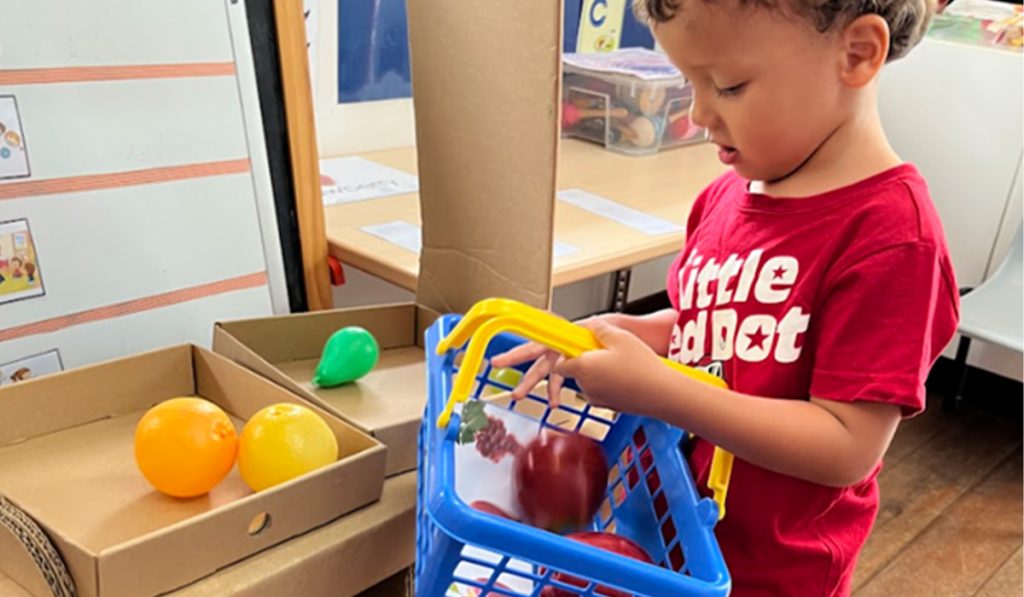
In kindergarten, literacy standards provide a roadmap for developing the core skills children need to become confident readers, writers, and communicators. They provide a balanced educational approach that nurtures language development while keeping learning engaging and relevant.
Holistic Approach to Literacy
A strong literacy foundation combines phonics, vocabulary building, and comprehension. By blending these elements, children can decode words, understand their meaning, and apply them in context. This all-inclusive approach fosters well-rounded literacy skills.
Literacy Goals
Kindergarten literacy standards often focus on milestones that lay the groundwork for future learning. These include:
- Understanding Sentence Structures: Recognising how words form sentences and basic sentence patterns.
- Sight Word Recognition: Learning to identify high-frequency words at a glance.
- Early Writing Skills: Beginning to write short sentences and express ideas on paper.
Such literacy goals help educators and parents determine their children’s literacy gaps and how to overcome them.
Informal Assessments
As part of the literacy roadmap, regular, informal assessments may gauge a child’s reading fluency and language skills. These could include storytelling exercises, word recognition games, or interactive activities that provide teachers insights into each child’s progress.
Financial Literacy Through Play
Introducing simple concepts like counting and money management through role-play shopping games and counting books integrates real-world learning into literacy activities. Such early learning experiences help children to connect abstract concepts to everyday situations.
Listening and Comprehension
Discussions about stories and characters are central to improving listening skills and comprehension. Children practice active listening, learn to articulate thoughts, and expand their understanding of language in meaningful ways.
Making Literacy Meaningful
While the mechanics of literacy—like syntax, punctuation, and spelling—are important, they may feel abstract or dry when taught in isolation. This is why we need to put them into the right everyday contexts that our kids can appreciate.
Let’s look at an example. When we ask our children to create their own ending to a story like The Little Red Hen, our intent is to get them to practice skills like sentence structure and spelling in a fun and engaging way. This is superior to plain rote learning.
8 Examples of Play-Based Literacy Activities in Kindergarten
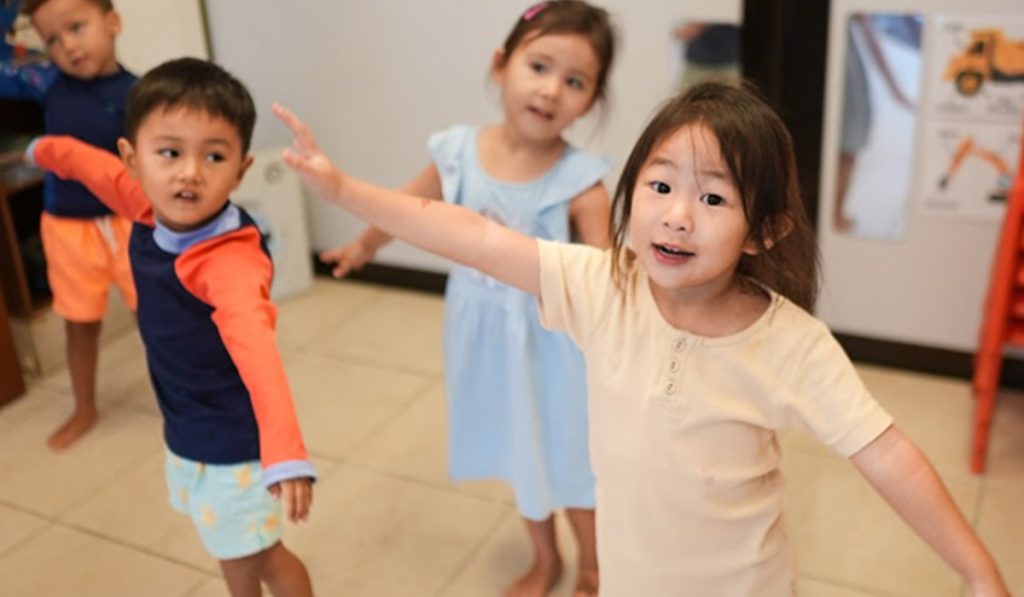
Next, let us explore some delightful play-based literacy activities that make learning both fun and meaningful for our kids. These ideas show how language can come alive, helping kindergarteners to learn while they laugh, imagine, and create.
#1 Story Corner Role-Play
There’s nothing quite like watching children bring a story to life. Whether they’re playing the brave hero or the clever sidekick, acting out stories deepen their understanding while sparking creativity. It’s also a great way for kids to practice expressing themselves confidently.
#2 Literacy Games
Who says learning letters and words has to be boring? Games like word-matching, letter puzzles, and phonics bingo turn what could be a routine lesson into a playful challenge. The excitement of winning or solving a puzzle keeps children engaged and eager to learn more.
#3 Sensory-Based Alphabet Play
Imagine tiny hands tracing letters in sand or moulding them from colourful play dough. Sensory-based alphabet play is not only effective—it can also be soothing and fun! Children love these tactile experiences, and they’ll remember those letters long after the play session ends.
#4 Thematic Literacy Activities
Themes like the changing seasons or cultural holidays add an extra layer of magic to literacy learning. Reading books about autumn leaves or creating crafts inspired by festive celebrations allows children to see how language connects to the world around them.
#5 Cooking and Recipe Reading
The kitchen can be a surprisingly great classroom. Simple recipes become literacy tools as kids read instructions and measure ingredients. They’re not just learning words—they’re learning how those words apply to real life, all while enjoying the delicious results!
#6 Insect Literacy Activities
Creepy crawlies are great topics for language learning! Kids love to explore, and insects make the perfect subject. Reading books about bugs, spotting them during outdoor play, and creating insect crafts bring together curiosity, literacy, and creativity in the most wonderful way.
#7 Design a Cosy Literacy Corner
Every child deserves a space where they can curl up with a book. A cosy nook filled with cushions, books, and colourful word walls creates an inviting atmosphere for independent reading. This is where imaginations take flight, along with a lifelong love for books.
#8 Music and Rhyming Games
Nothing is more joyful than singing songs and playing with rhymes. These musical activities not only improve phonemic awareness—they also make language learning a delightful experience. Who doesn’t love a catchy tune that teaches at the same time?
How Heartfield Weaves Literacy into Our Curriculum
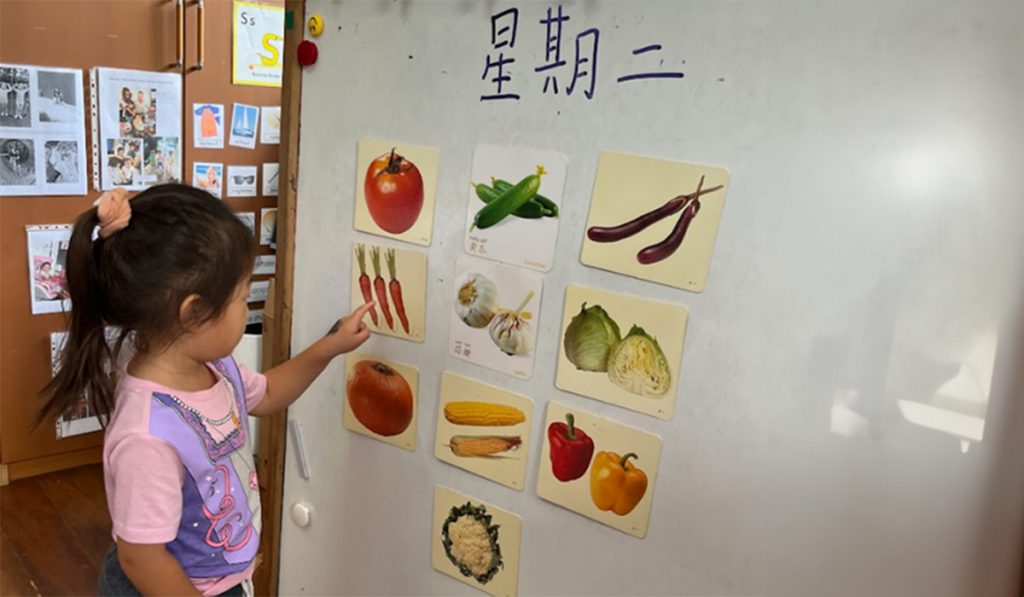
At Heartfield Kindergarten, literacy is not just taught—it’s caught! We believe that language learning should be dynamic, interactive, and meaningful. This is why we integrate play-based literacy into every part of our curriculum.
From the onset, our approach combines play-based literacy activities with thematic, multi-sensory learning. From crafting stories inspired by a museum visit to documenting findings after a garden walk, our children explore language in ways that connect to the real world.
Bilingual storytelling sessions are a cornerstone of our programme. They expose children to both English and Mandarin through engaging tales that develop listening and comprehension skills. Such a dual-language approach builds not just literacy but cultural understanding.
We also offer interactive discovery stations where children can read, write, and play vocabulary-building games. These stations make learning hands-on and exciting, allowing kids to explore language at their own pace.
Outdoor play adds another layer of fun and learning, as children can read garden-themed books and identify plants during exploration sessions. These activities build both literacy and an appreciation for nature.
During circle time discussions, we get our children to share stories, practice speaking, and gain confidence. Weekly Show and Tell sessions, conducted in both English and Mandarin, further encourage self-expression and public speaking in a supportive environment.
Our classrooms feature language-rich corners filled with books in different languages and genres, giving children access to a world of stories. From reading recipes during cooking classes to writing letters in our post-office corner, literacy is woven into their everyday experiences.
To celebrate milestones, we organise themed literacy events, such as dramatisations of favourite stories, or crafting of poems inspired by noodle-making activities. Other creative writing projects include rewriting classic tales, changing song lyrics, or writing their own books—these allow children to express themselves while mastering language skills.
By weaving literacy seamlessly into every aspect of our curriculum, we nurture confident, curious learners ready to take on the world—one word at a time.
Located at 31 Balmoral Road, we invite you to explore how we can contribute to your child’s early success. Contact us at +65 6835 2354, email info@HeartfieldKindergarten.com, or visit our website to arrange a visit.
